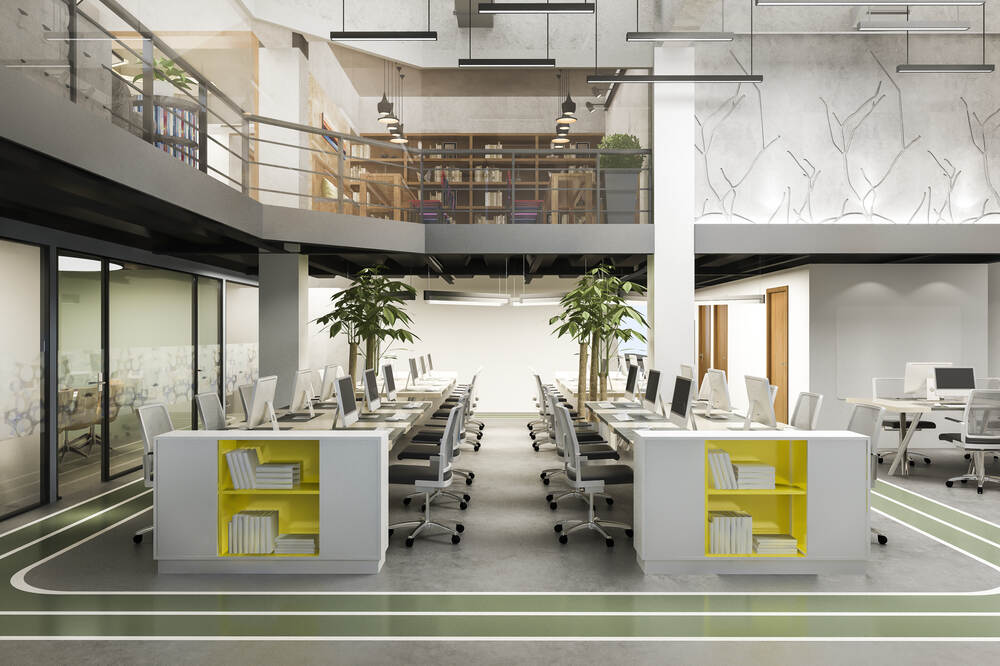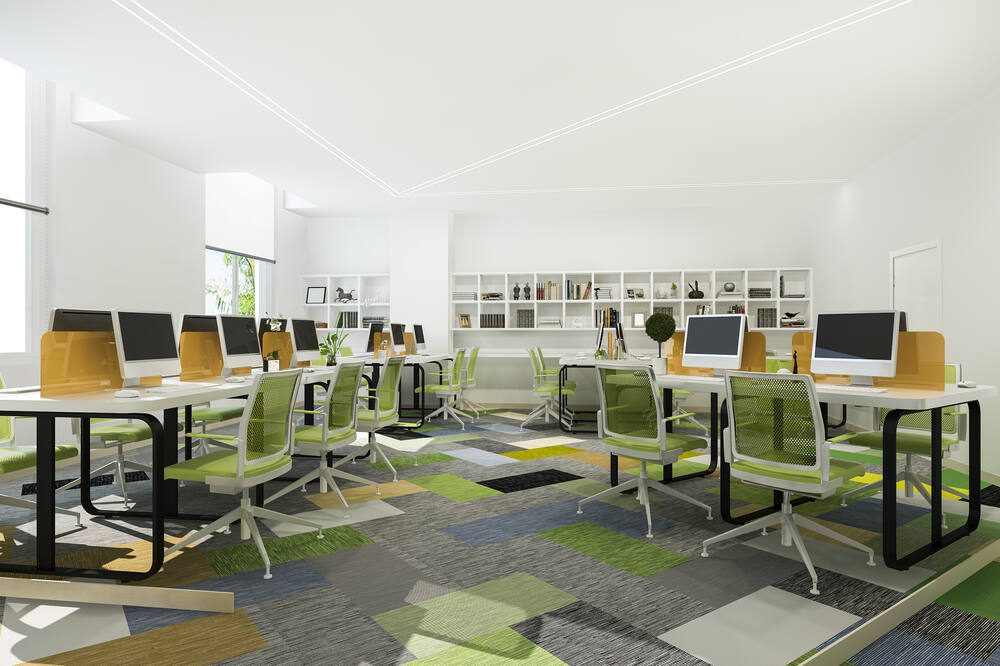
Growing businesses face constant changes, from expanding teams to evolving workspace needs. Adapting to these shifts requires practical, scalable solutions. Modular workstations offer the flexibility to reconfigure layouts, maximize space, and support productivity without compromising style or functionality. Paired with flexible office furniture and innovative business workspace solutions, these workstations are essential for creating adaptable environments that grow alongside business demands.
Here are the five benefits of modular workstations for growing businesses.
Key Takeaways✔ Modular workstations adapt to changing business needs, offering reconfigurable layouts for evolving workspaces. ✔ They foster collaboration by creating flexible zones that encourage teamwork and innovation. ✔ Cost-effective designs reduce expenses through durability, reusability, and efficient space utilization. ✔ Employee productivity improves with ergonomic, customizable workstations tailored to individual comfort. ✔ Modular systems support sustainability with eco-friendly materials and reduced waste through reusability. ✔ Industries like tech, healthcare, and education benefit from modular solutions for their versatile and task-specific designs. ✔ Proper maintenance, including regular cleaning and professional servicing, extends the lifespan of modular workstations. |

Modular workstations are customizable and adaptable furniture systems designed to meet the dynamic needs of modern workplaces. These workstations consist of individual components, such as desks, shelves, dividers, and storage units, that can be configured and reconfigured to suit various tasks, team sizes, or office layouts. Their versatility makes them an ideal choice for growing businesses, as they optimize space, support collaboration, and provide flexibility without the need for constant furniture replacements.
Growing businesses often face challenges in managing workspace changes as teams expand or project requirements evolve. Modular workstations provide a flexible, scalable solution, allowing companies to adjust layouts and resources to meet new demands. This adaptability helps businesses maximize their potential while keeping operations efficient and seamless.
Collaboration is critical for business success, especially in environments where teamwork drives innovation. Modular workstations make it easier to create spaces that encourage interaction while maintaining a functional layout. These systems adapt to different team sizes and tasks, making them invaluable for fostering communication and teamwork.
Managing budgets is a priority for growing businesses, making cost-effective solutions essential. Modular workstations offer long-term value by reducing waste and lowering expenses associated with frequent furniture replacements. Their durability and reusability make them a smart investment for businesses seeking business workspace solutions that pay off over time.
A comfortable workplace boosts employee satisfaction, which directly impacts productivity. Modular workstations can be tailored to meet individual needs, offering ergonomic and functional designs that support well-being. These systems create environments where employees feel motivated and focused.
Sustainability has become a key priority for modern businesses looking to minimize their environmental impact. Modular workstations align with this goal by offering eco-friendly solutions that support sustainable practices. From reducing waste to incorporating recycled materials, these systems help businesses make greener choices.
Proper maintenance is essential to keep modular workstations functional and durable, especially as the market evolves with shifting workplace needs and innovations from 2018 to 2033. Following consistent care routines and addressing issues promptly can help businesses maximize their investment in these flexible office furniture systems. Here are six practical steps to maintain and extend the life of modular workstations.
Dust and debris can accumulate on workstations, especially in high-traffic areas, leading to wear and tear. Wipe down surfaces with a soft, damp cloth and mild cleaning solution to remove dirt without damaging the materials. For wood finishes, use furniture polish or a wood-safe cleaner to maintain their shine and prevent cracks. Regular cleaning keeps workstations looking professional and extends their longevity.
Over time, screws, connectors, and other small components of modular workstations can loosen due to daily use. Conduct periodic inspections to identify and tighten any loose parts, ensuring the workstation remains stable and secure. Promptly replace worn-out or damaged components, such as wheels or hinges, to avoid larger problems that could impact usability.
Each modular workstation is designed with specific weight limits for desks, shelves, and storage units. Overloading these components can lead to bending, cracking, or other structural damage. Educate employees on weight capacities and distribute items evenly to prevent undue stress on the furniture. For heavy equipment, consider adding reinforced modular pieces designed to handle extra load.
Prolonged exposure to direct sunlight can fade finishes or warp materials, while moisture can weaken wood or cause metal components to rust. Position modular workstations away from windows or use UV-protective films on glass to shield furniture. For damp environments, ensure proper ventilation and use moisture-resistant finishes on vulnerable surfaces.
Frequent rearrangements can strain modular components if not handled carefully. Follow manufacturer guidelines when disassembling or reconfiguring workstations, and use appropriate tools to avoid damaging connectors or surfaces. Moving modular workstations with care preserves their integrity, ensuring they remain functional and visually appealing through multiple setups.
When workstations require significant repairs or adjustments, hiring professionals ensures the job is done correctly without compromising the furniture. Experts can assess the condition of modular systems, perform necessary fixes, and even provide advice on extending their lifespan. Working with experienced professionals saves time and ensures flexible office furniture remains in optimal condition.

Modular workstations offer unmatched versatility, making them ideal for a wide range of industries. Their customizable designs and adaptability allow businesses to create functional, efficient spaces tailored to their specific needs. Here are six industries that can maximize the advantages of modular workstations and flexible office furniture.
The fast-paced tech industry thrives on collaboration and rapid innovation, making modular workstations an excellent choice. Startups often face fluctuating team sizes and evolving project needs, requiring furniture that can grow and change with them. Configurable layouts support brainstorming sessions, hot-desking, and hybrid work models, ensuring the workspace remains agile and efficient.
Creative industries like marketing, design, and content production benefit greatly from the flexibility of modular workstations. These businesses often require adaptable layouts for brainstorming areas, project hubs, or quiet editing zones. Modular furniture allows for seamless transitions between collaborative and individual work, fostering creativity without sacrificing organization or efficiency.
Healthcare facilities, from clinics to therapy offices, can use modular workstations to optimize their spaces. Modular designs support the organization of patient files, medical equipment, and administrative tasks in compact, efficient layouts. Their reconfigurability also makes it easier to adapt workspaces for new treatments, staff needs, or expanding services.
Educational institutions and corporate training facilities benefit from modular workstations’ ability to create versatile learning environments. Desks and tables can be rearranged for lectures, group work, or individual study sessions. With integrated cable management and tech-friendly features, modular systems also support the growing reliance on technology in education.
Traditional corporate offices can use modular workstations to transition away from static layouts and into dynamic, collaborative environments. These systems allow businesses to divide open spaces into functional zones for meetings, focused work, or team projects. Modular furniture also makes it easier to accommodate reorganizations, new departments, or evolving business goals.
Retail environments and call centers often require efficient layouts that prioritize employee performance and customer interactions. Modular workstations can be customized to create ergonomic setups for staff while maximizing space for inventory or customer service desks. With flexible office furniture, these businesses can reconfigure their spaces as operations grow or change.
Yes, modular workstations are highly suitable for home offices due to their adaptability and space-saving designs. They allow individuals to create functional layouts even in limited spaces, making them ideal for remote work setups. Features like built-in storage, ergonomic components, and flexible configurations help optimize productivity in home environments. Modular workstations also integrate seamlessly with other flexible office furniture, providing both style and functionality.
Modular workstations often include built-in cable management systems to keep cords organized and out of sight. These features prevent tangling and reduce clutter, creating a clean and professional workspace. Many modular systems are designed with channels, trays, or concealed compartments specifically for managing cables from computers, monitors, and other devices. This functionality makes them an integral part of efficient business workspace solutions, especially in tech-heavy environments.
Yes, modular workstations can be designed to include standing desks or height-adjustable components. Many systems now feature ergonomic options that allow users to switch between sitting and standing positions throughout the day. These adjustable setups support better posture and overall health, making them a popular choice in modern offices. Integrating standing desks into modular configurations ensures businesses can offer flexible office furniture options tailored to employee needs.
Many modular workstations are made from sustainable materials, such as recycled metals or responsibly sourced wood, making them eco-friendly. Their reusability and ability to adapt to different layouts reduce waste compared to traditional, single-use furniture. Additionally, some manufacturers utilize energy-efficient production methods to further minimize environmental impact. Choosing modular workstations aligns with sustainability goals while providing innovative business workspace solutions.
Yes, modular workstations can include privacy-enhancing features like partitions, soundproof panels, and desk dividers. These additions help create quiet, focused spaces for employees in otherwise open layouts. Privacy options are customizable, allowing businesses to strike a balance between collaboration and individual work. Modular workstations equipped with such features are ideal for companies seeking flexible office furniture that adapts to various work styles.
Stamford Office Furniture in New Haven, CT, offers expertly crafted modular workstations designed to meet the evolving needs of modern businesses. With a commitment to quality and functionality, our flexible office furniture solutions help optimize workspace layouts, enhance productivity, and support growth. We deliver innovative designs that combine style and practicality.
Visit our showroom to discover modular workstations tailored to transform any office environment!